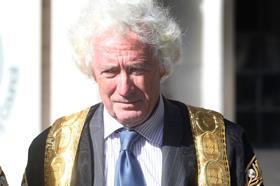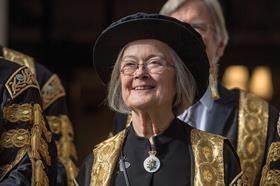Former Supreme Court heavyweights Lady Hale and Lord Sumption may not agree on everything, but they were singing in harmony to the House of Lords Constitution Committee this week.

Appearing together as witnesses in the committee’s inquiry into the rule of law, the two were in accord on the need to improve public perception, the importance of the role of judges – and the perils of poor journalism.
Lady Hale said it would be a ‘huge improvement’ if the curriculum in schools – including primary schools – taught children the basics of the constitution. This would include ‘what parliament does, what government does, the difference between the two, which people do not often understand, what the courts do and the rule of law’.
She added: ‘They are not difficult as basic principles… and could be explained to children at all sorts of levels.
‘It is done in a lot of other countries in the world,’ she said. An understanding of the basics would counter ‘the misinformation that can come through the media whether they are social media or legacy media, there is a lot of misinformation.’
Sumption added: ‘People are distressingly ignorant about the basic way that all three branches of the state work.’ The media’s role, meanwhile, ‘has been to oversimplify and therefore mislead’.
The role of lawyers was also discussed during the 90-minute meeting, spurred by questions from former justice minister Lord Bellamy (Christopher Bellamy KC). Our system is ‘almost wholly dependent on the integrity, professionalism and competence of the legal profession’, he observed. If that weakens, is our whole system at risk?

Hale replied: ‘Any system that depends to a large extent on lawyers does depend upon the skill and integrity of the people [in] that profession. We do attempt to achieve that, not always successfully, but we do have regulatory bodies that do attempt to achieve that.
‘A greater problem, I think, is inequality of arms in that there are quite a few situations in which one side will have a lawyer, and the other side won’t have a lawyer. [That] puts… huge burdens on the judge.’
In a wry comment on her former colleague, she noted ‘there is also the question that some parties can afford Lord Sumption, and others cannot’. Given that Sumption is an ‘incredibly effective advocate’ there is ‘that sort of inequality of arms as well’. A ‘national legal service to which everybody has to go’ might be one solution – but that would have its own problems, she said.
Sumption said the judiciary is capable of dealing with disparities in the quality of counsel. ‘Judges, particularly in the appellate courts, are very good at questioning the premises which have been put before them, or at least trying to confirm whatever issue that troubles the judge has actually been thought through by counsel. I do not think it is right that judges, so to speak, are straitjacketed by the integrity of counsel.
‘I would be very surprised in any case to discover that there was some legal principle that had been entirely overlooked simply because counsel had not drawn attention to it.’
But what of the wrongful convictions in the Post Office Horizon scandal? That was a ‘particular problem because the issues that were overlooked were issues of fact’, Sumption said. He added: ‘Judges have no power to call, so to speak, their own evidence or require parties to put in particular expert evidence. It is fair to say that what essentially unlocked the Horizon problem was the decision of an extremely experienced judge with considerable expertise in IT systems in cutting through it.’
Hale revealed she had been visiting courts and tribunals ‘up and down the country’ and had been ‘incredibly impressed with what goes on there’. She added: ‘The press can do enormous damage by diminishing confidence in the rule of law and the administration of justice but, for what it is worth, my empirical observations have been pretty favourable.’
Sumption agreed: ‘I think that, at many levels, the civil service and the courts and indeed the political level of the government… we, by and large, try to do the right thing. The fact we do not always succeed does not mean to say that the rule of law does not thrive.’































17 Readers' comments